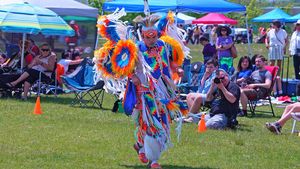When Madonna's Blond Ambition tour launched in 1990, the world hadn't seen a pop spectacle as confrontationally queer and delightfully subversive as her's. At the time, she was the biggest star on the planet, fresh off the release of Like a Prayer, which saw the single, "Express Yourself," encouraging listeners to shamelessly celebrate their individuality--a novel, even provocative, message in a pre-Born This Way climate. Armed with an affecting voice, Madonna was able to spread her ideas across the globe like religion, planting the seeds for a new generation of sexual liberation and LGBTQ empowerment.
But Madonna didn't arrest the world alone, though her iconic Jean-Paul Gaultier cone bra and on-stage masturbation simulation certainly caused a lasting stir. Every night, the singer was joined by a pack of backup dancers--primarily queer men of color--whose identities alone were a protest against the homophobic, quietly racist culture they performed in each night. These Blond Ambition pillars became stars in their own right, as their lives on tour were ultimately captured forever in Madonna's 1991 documentary, Truth or Dare.

Blond Ambition dancers on tour
Directed by Alek Keshishian, the personal black-and-white film was about more than Madonna, rawly capturing the entire culture surrounding her Blond Ambition tour. Discussions about the sweeping HIV epidemic took center stage, dancers Vogueing in full-femme bras made appearances and taboo scenes of queer men kissing provoked mainstream cinema. Through Truth or Dare, Madonna's dancers left a public legacy and fostered a wave of LGBTQ fearlessness that might have otherwise remained in the closet.
Now, 25 years later, six of the seven Blond Ambition dancers have reunited under the spotlight for a new documentary, Strike a Pose, directed by filmmakers Ester Gould and Reijer Zwaan. In the dizzying wake of a tour with Madonna, the 2016 Tribeca Film Festival selection catches up with Luis Camacho, Oliver Crumes III, Salim Gauwloos, Jose Gutierez, Kevin Stea and Carlton Wilborn as they adjust to life off stage. From overcoming drug and alcohol abuse to facing disappointed family members and coping with death, Strike a Pose is at once humbling and empowering--a raw, relatable display of life's inevitable ups and downs.
We recently sat down with Salim Gauwloos, Jose Gutierez and Kevin Stea of Strike a Pose, ahead of the doc's official Logo premiere on April 6.
OUT: Why did you create this documentary now?
Jose: I was the last one to come on board because I was very iffy about the project. I hadn't really seen these guys for 25 plus years, so what would be the point of coming into their lives now? I didn't even know if they wanted that--I was fearful of that. So many things weren't said between us, because I was either too young to say them or too close-minded to admit it. But once I met with the directors, I liked their vibe; I was comfortable with them and the fact that they're not from America had a lot to do with it, because it made me interested in what they saw in our story--why were they so interested in it?
Were you nervous to let your guards down on camera?
Jose: I was very nervous, because in the beginning, we promised never to see any of the footage. I didn't want some of those scenes in there, like ones with my mom, but I made a promise to the directors to not go back and ask for things to get cut. I'm glad I participated because it was healing for me to revisit what happened in everyone's lives, and I'm glad that that my story has been relatable to so many people in the LGBTQ community.
Salim: None of us saw the movie until we went to the Berlin premiere.
Kevin: We also didn't know what anyone else had said in the film, which was nerve-racking. But it was a beautiful moment to see it all together.
Jose: I was sinking in my seat because you see yourself up there, larger than life on the big screen.

Jose Gutierez & his mom
How did it feel reuniting for this film?
Jose: Back then, because we were such kids, there was never really--I mean, yeah there was an unspoken appreciation for each other because we knew we were going to be there and see each other the next day, but when you're a kid, you don't really think about friendship. It's all in the moment. So I think after [Blonde Amibition] was said and done, when we dealt with our separate lives and so much has happened as individuals, coming together now has been great. It's been like we never left each other at times and healing for us--moments like this, where we come together and I can now say to him how much I loved him because then I was too caught up in my own life and everything it took to be on stage.
How did Madonna affect your relationships?
Kevin: I think in some ways she smoothed out our relationships and set the ground for us to have this ongoing relationship, because when we had tension or things going between us, she stepped in and said, 'No, you need to get along. You need to understand each other see each other's point of view.' And I think that's lasted.
How was the transition to regular life after Blonde Ambition?
Kevin: I got home and had no money, no car--lots of clothes, nowhere to live. It was like I had to wake up and realize there was no plan for the next year--a rude awakening.
Jose: When you go to the top so young, where do you go next? We all had a job that dancers trained lifetimes to get. I was 18, so I had no choice but to fall back a little bit. And I think we all went through that. People have the tendency to be like, 'Wow these guys danced with Madonna. Oh my God, I wish that I could be like that.' Yeah, it's very great to hear that at that moment, but after you're like, 'If only they knew.'

Kevin Stea
Were your dance careers affected by the tour?
Jose: I went on tour and had no agent or management, so whatever work I got was because of Blonde Ambition. I wasn't really going to auditions; they were calling me, so I never really had a manager or agent tell me, 'This is the business, you go here.' It kind of spoiled me in a way, so now that I'm older, I'm learning that it's not like that for everyone. Now I reflect on that and think, 'Wow you did all of this on your own. Imagine if you did have an agent.' That always keeps me striving--that's what keeps the fire.
Kevin: It gave me some very high standards. I thought that's the way things were--that's the way I would always be treated and the way all tours are.But it's not like that at all in the business. I was grateful at the time, but I'm more grateful now, looking back at all the experiences I've had over the years going, 'Wow, that was really special. She did treat us really well.' I mean there were some jobs I didn't get because I was so identifiable as dancing with Madonna, but in the long run it didn't do anything but give me a great work ethic, and keep me motivated and grounded, because I knew what was possible--I knew what I could do, and what I wanted to do. I was addicted to it once I had been on stage for a while, just because that energy coming at you is overwhelming.
Salim: After the tour, I didn't dance for a bit; I went on a big drug craze because I was dealing with my HIV and all of that was completely blank. The good part about it is everything I learned from these guys and from Madonna--I still use that to this day in my career, but I wish I would not be so afraid after the tour. I just wish I lived my life a little bit.

Salim Gauwloos
What was life like on tour?
Jose: There were really no rules and if there were, we broke them.
Salim: You used to have to take the bus from the hotel to the venue and if you were late, they would charge you like 50 dollars. Our charge at the end was like 6,000 dollars.
Jose: Yeah, but they always made sure we got there even if we were late--it was just a threat. There was no second cast in the show. We knew we were irreplaceable and we took advantage of that.
Kevin: Our experience won't happen again because with social media, everybody has connections to home; they can get online immediately--email, cell phones, texts. We had none of that. It was just us at the club, us at the venue, us on the bus. We were all we had.
Were there any elements of Blonde Ambition that challenged you?
Jose: Absolutely they were challenging. I mean, really we were put out there to push all of these buttons and be so sexual. To do it for like 225,000 people, you know and the Vatican against you and death threats coming into your hotel room. But as a performer, you want to go out there and push those buttons--you want to go out there and go against the grain.
Kevin: Who knew a bra could be so challenging to people.

Jose Gutierez
You sued Madonna for breach of contract with her Truth or Dare documentary...
Kevin: The press turned it into a diss against her and that was not the intention. The intention was to raise awareness for dancers' rights and to stand up for ourselves and stand up for our contract. I don't regret it at all because it's given me a voice over all these years to speak up for others. I wish I had more communication skills to clearly state my case with her, rather than appeal on an emotional level. I would've liked to just say, 'Hey, it's in my contract. Let's move forward.' My agency threw me under the bus by making me sue rather than having them give me money. It's just a lot of miscommunication.
Do you have relationships with Madonna now?
Jose: I continued to work with her for a period of time after a couple of years after Blonde Ambition, but she eventually got really being an actress and we got pushed to the side. I rebelled because I was a kid and wanted to know why we were being put aside--why there wasn't that attention there anymore. Why aren't we shopping? And as a kid, you're not looking at this like it's a business. Because of my personal relationship with Madonna, I took that so personally.
Salim: After the tour, that was it--I never saw her again. Me and Madonna connected, but I think I always connected with her more on stage than off stage. And coming from Europe too, I had to get used to American culture. Everything was pretty new for me.
Kevin: I obviously didn't--the lawsuit put a wrench in everything. After the tour we weren't really working together, but I was spending the holidays with her with my family. I think that's why I felt so familial with her and then when the lawsuit came around it was like a big break. I saw her again in the early 2000s. It was very nice holding hands and talking.
Jose: I always felt like I owed some loyalty to her, so those jobs that were being offered, even long after it was done, I turned a lot down--Michael Jackson and stuff like that. You know, she was scheduled to work with him at one period of time. We were in charge of doing all the artistic directing, and he said no to the project because he got scared of the whole gay thing. The whole idea was she was going to do drag as a man and he was supposed to do drag as a woman, but he had a problem.
What are you hoping people will take away from Strike a Pose?
Jose: I want people to take away hope and inspiration. I want people to know that that there is some kind of light at the end of the tunnel for all of us--even us fabulous people you saw on stage go through stuff. You're one of us. You're not different, you're normal, you're going to be okay. I'm okay--I want people to that that we're okay.
Kevin: I'd like them to take away the value of courage, and also that there's always another side to the story.































































































